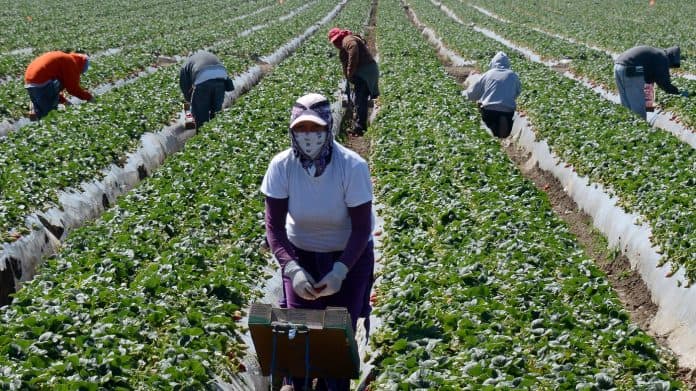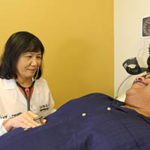Dr. George Yazigi raised his right hand, took his oath of American citizenship, and then sped off to care for immigrant farmworkers in one of Central Florida’s poorest communities. The UCF resident physician says his volunteerism after “the biggest honor of my life” was his way of “giving back to the community where I live.”

The timing of his citizenship ceremony – on the same day he worked at UCF’s Farmworker Association of Florida clinic – was a coincidence. Or maybe, he says, it was meant to be as a way to illustrate the importance of volunteering to help others. “As a doctor, I see the need,” he said. “I have the chance and the ability to help those who need care.”
Dr. Yazigi grew up and went to medical school in Syria. Two years ago, he was selected for UCF’s Internal Medicine residency, a partnership with Osceola Regional and the Orlando VA medical centers. He is in his second year of a three-year residency and hopes to become an interventional cardiologist because “so many people have cardiovascular disease, I want to help be a part of the solution.” He said he wanted to become an American citizen because “I love the principles this country stands for – freedom and the rule of law.” But he believes citizenship comes with responsibilities: “You have to give back, serve and engage with others. That’s your duty as a citizen.”
He has witnessed around the world those in desperate need of healthcare. The Apopka clinic often sees about 100 patients in one night. They range in age from newborns to the elderly. Many work long hours in the fields or in greenhouses. Some are undocumented workers. No one has insurance. And they have little, if any, healthcare for chronic conditions like diabetes, heart disease, and high blood pressure. Many suffer the effects of pesticide and sun exposure.

Dr. Judy Simms-Cendan, UCF professor of obstetrics and gynecology and director of international experiences, helps run the Apopka clinic. She said residents like Dr. Yazigi are “wonderful role models and an incredible inspiration to our medical students. They reassure students that although residency is challenging, you can still have time to do meaningful service work and make a difference for the underserved in our community.”
Dr. David Simmons, an Orlando internist and UCF volunteer faculty member who helps with UCF’s global healthcare efforts, said the residents actually came to him asking to help in Apopka. “The residents truly inspire me with their enthusiasm,” he said. Dr. Simmons also noted that the backgrounds of the young physicians are as diverse as the community they serve. “To date, we have had residents from Syria, Jordan, Turkey, Egypt, Iraq, Iran, Peru, Ecuador, Colombia, India, Pakistan, and Burma take part,” he said.

The UCF-HCA internal medicine residency at Osceola Regional holds resident wellness programs – in part to help prevent burnout for young physicians in training. Dr. Abdo Asmar, who leads the residency program, says volunteerism and giving back increase mental and physical wellness by helping residents focus on others.
Dr. Yazigi agrees. “At the end of a really long night of volunteering, you feel really good,” he said. “You’re energized, and you don’t know why. But it’s because you gave back. You served.”
Deborah German, M.D. is the Vice President for Health Affairs and Founding Dean of the UCF College of Medicine.



